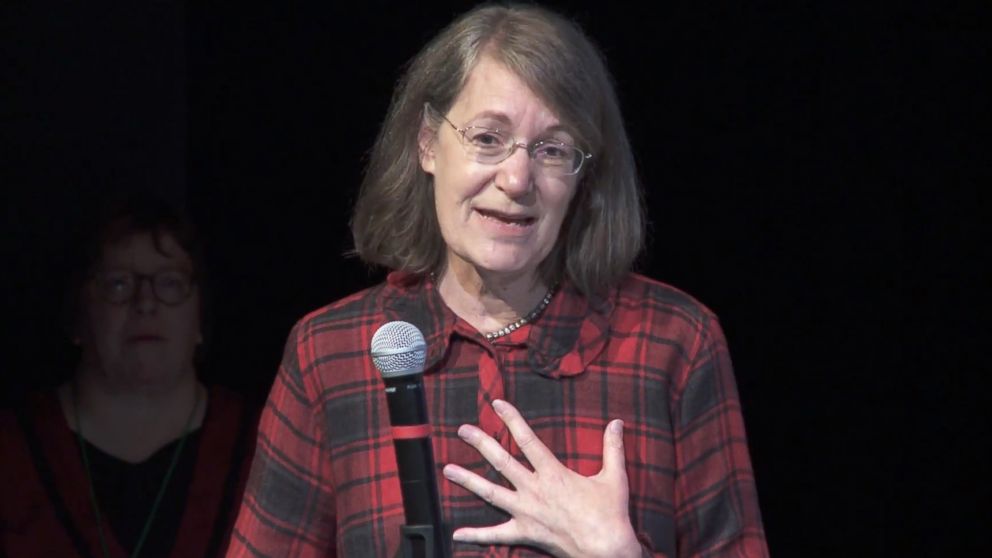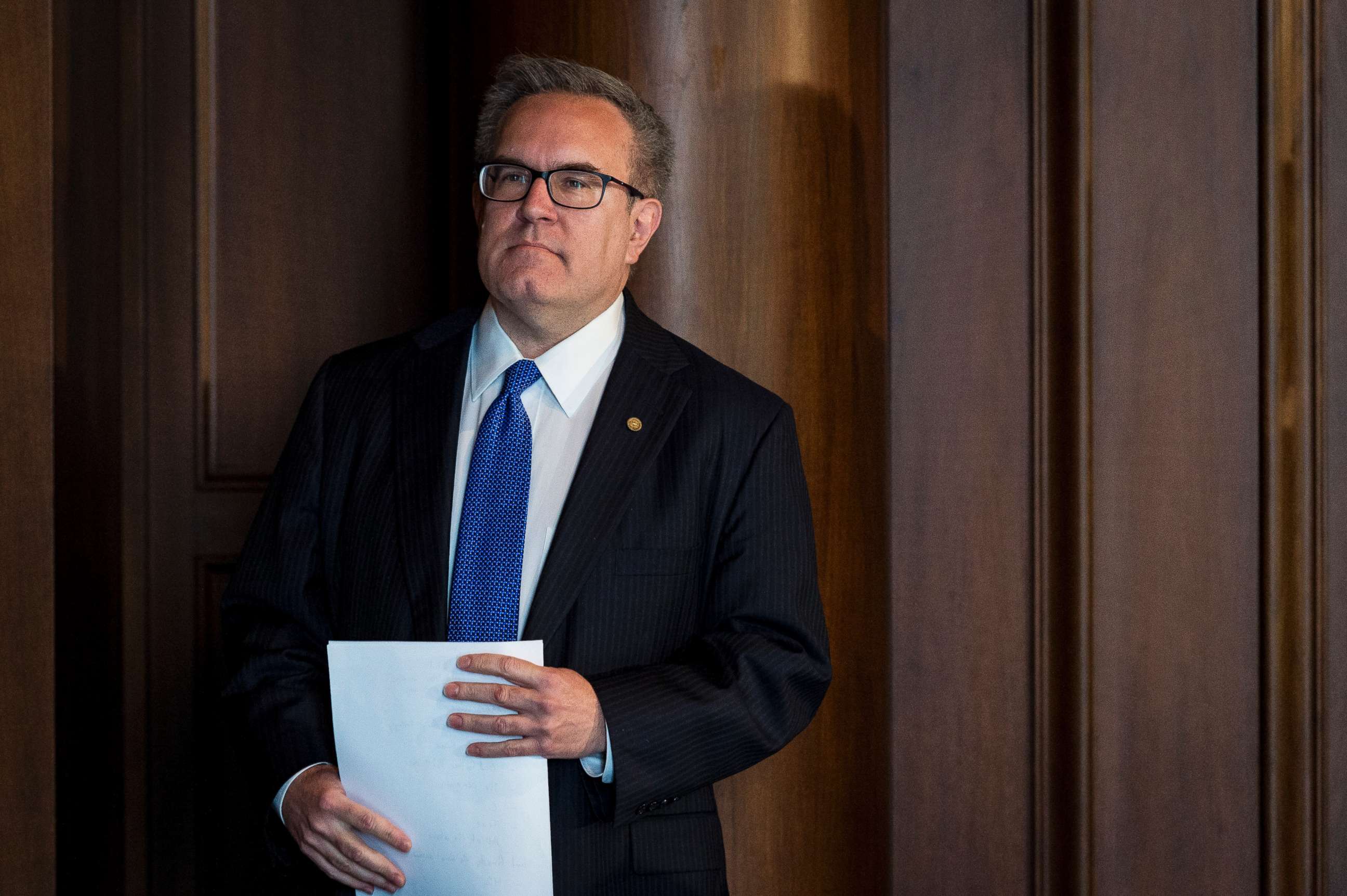Trump admin touts children’s health programs amid questions about ousting top scientist
Advocacy groups are worried about the EPA’s commitment to kids' health.
Less than a week after the director of children’s health issues at the Environmental Protection Agency was placed on leave, acting EPA chief Andrew Wheeler stood in front of agency headquarters Monday next to a yellow school bus and announced $20 million in state grants to test drinking water for lead in schools and childcare facilities.
Wheeler also said the EPA will also provide $9 million for companies that own buses used by public schools to replace older buses with cleaner vehicles.
The move was intended to show the public that the EPA – the federal government’s primary environmental regulator – was committed to protecting the health of children.
The EPA considers children uniquely vulnerable to harm from pollution and contamination because their bodies are still developing and behavior like playing on the ground could expose them to more dirt and dust than adults. The agency regulates lead and asbestos contamination in school buildings, chemicals connected to developmental problems and cancer and airborne pollution that can contribute to asthma. The agency gives out billions of dollars in loans and grants to states working on public health issues that affect children.
"Children’s health is a top priority at EPA, and we have made tremendous progress improving air and water quality and helping kids and families lead healthier lives," Wheeler said in a statement Monday.
Advocacy groups, however, say they have doubts about the EPA’s commitment after Office of Children's Health Protection Director Ruth Etzel was placed on administrative leave last week. The New York Times first reported the development, with Buzzfeed later reporting that Etzel wrote in an email that the agency was trying to “disappear” that office.
Etzel did not respond to ABC News' request for comment.

Wheeler denies the agency is trying to eliminate the children's health office and said at an event Monday that Etzel was placed on leave to investigate "allegations" against her, though EPA officials would not comment on the nature of the allegations.
"I just want to make sure that everybody understands that it's no reflection on the office itself and the important work that office does," Wheeler said.
Jeff Ruch, director of the whistleblower group Public Employees for Environmental Responsibility, said administrative leave has been used as a purgatory for government employees that cause problems for officials but who don't have cause to fire them and that there is no process for the employee placed on leave to try and appeal the decision.
Ruch said he could not comment on Etzel's case specifically, citing concerns of attorney-client confidentiality.
Advocacy groups like Moms Clean Air Force say they are raising the alarm and asking members to call their representatives in Congress and press for answers.
Heather McTeer Toney, a former regional administrator at EPA and now National Field Director for Moms Clean Air Force, said they are especially concerned that Etzel was removed at the same time EPA moved forward a proposal that could change how the agency regulates mercury, which is considered especially harmful to babies and young children. Toney said she worked with Etzel at least once while at EPA and that she was especially passionate about the environmental impact on children's health, saying she "literally wrote the book" on the issue.
Etzel is a founding editor of the textbook "Pediatric Environmental Health" published by the American Academy of Pediatrics, according to the George Washington University website. She is a professional lecturer at the university and previously worked for the World Health Organization and multiple government agencies prior to EPA, including the Centers for Disease Control.
"Dr. Etzel has never been afraid to speak truth to power, she's never shied away from what the science says and she most certainly has always been a champion for children. So when we see someone like her removed from such an important post we ask questions and we look very closely at what they're doing. And what it says to us right now is we should be very concerned," Toney said.
The American Academy of Pediatrics along with dozens of health schools and environmental and health advocacy groups wrote to Wheeler on Monday expressing "great concern" that Etzel was placed on leave. The letter asks for a meeting with Wheeler and an explanation for why Etzel was placed on leave.
"By placing Dr. Etzel on leave, the EPA has sent a signal that children's health is not a priority for the agency. We are particularly perplexed that this move has happened mere days before the start of Children's Health Month," the groups wrote. "The undersigned groups ask that EPA immediately clarify what action it has taken with regards to Dr. Etzel and with regards to (the Office of Children's Health Protection), and make no further attempts to dismantle, re-organize, diminish, or otherwise reduce the abilities and authorities of OCHP."
Wheeler said Monday the agency is not changing the mercury standards and that utility companies have already installed equipment to reduce mercury emissions to comply with the existing rule. The new EPA analysis is not public but is expected to change how the agency calculates the cost and benefit of proposals compared to the Obama administration, which they have said overestimated benefits of rules like restrictions on carbon dioxide emissions by including secondary benefits like reducing pollution that contributes to smog.

He also said that despite EPA's analysis that proposals to replace the Clean Power Plan and fuel efficiency rules would result in more pollution that could harm human health that rules to protect children from pollution are still on the books.
Advocacy groups say they are still concerned that less emphasis on possible health benefits from pollution rules shows the agency is not focusing enough on protecting children's health.
The EPA's internal watchdog has also raised concerns that EPA doesn't provide enough resources to its programs to clean up or test for contamination in school buildings. In a report released last month, the EPA inspector general said that EPA has moved resources away from testing for asbestos in schools in most states and that states were no conducting required inspections. EPA now says they will dedicate more resources to the program.
Wheeler also responded to criticism that some of EPA's proposals to roll back or change rules proposed under the Obama administration would hurt children's health by allowing more pollution from power plants.




